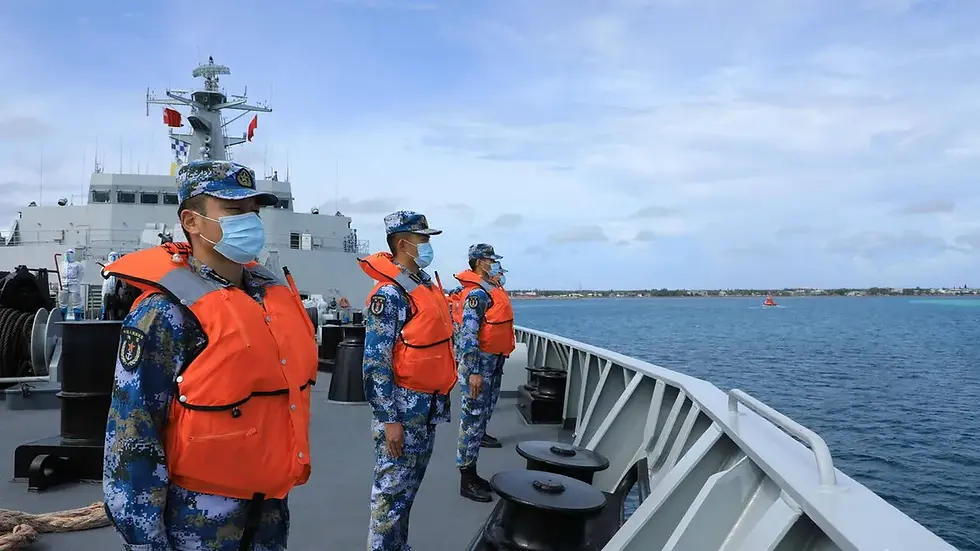The Badly Needed EastMed Pipeline Awaits Approval - by Judith Bergman for the Gatestone Institute
- Michael Julien

- May 12, 2022
- 3 min read
Here is the summary dated 12.05.22:
"Germany must be prepared that it could be the next country to which Gazprom cuts gas deliveries. Europe, therefore, needs a multitude of alternatives to the Russian energy supply." — German Chancellor Olaf Scholz, The New York Times, April 28, 2022.
The pre-feasibility studies [of the EastMed pipeline that would transport gas to Europe from Israel and Cyprus through Greece], conducted from 2015-18 and paid for by the European Union, found that the project is "technically feasible, economically viable and commercially competitive."
"The analysis conducted for the activity related to the economic, financial and competitiveness studies, evidenced that the [EastMed] Project contributes to the improvement of market integration of currently isolated countries such as Cyprus and some Greek regions, to the enhancement of energy security diversifying the supply sources for Europe and to the reduction of the EU-wide consumers' gas bill." — Conclusion of pre-feasibility studies published by European Commission, July 2019.
"Moreover, taking into account the need of additional net imports to satisfy EU gas demand by 2030 and the risk associated to the current production availability, procurement and transport of gas supply, the Project provides strategic contribution to the EU security of supply." — Conclusion of pre-feasibility studies published by European Commission, July 2019.
The significant rise in natural gas prices in Europe favors the economic viability of the pipeline, according to energy expert Michalis Mathioulakis, of the ELIAMEP think tank.
[US Under Secretary of State for Political Affairs Victoria] Nuland's comments appeared especially odd as, after meeting with her counterparts in Turkey on April 4, she told the Turkish newspaper Hurriyet that more pipelines were needed in the Eastern Mediterranean.
The US, it appears, prefers to steer the business to Turkey's strongman, President Recep Tayyip Erdogan, rather than to America's democratic allies, Cyprus, Israel and Greece.
According to the Biden administration, therefore, pipelines that go via Turkey are apparently acceptable, Algerian gas pipelines are also acceptable, but the long-planned Israeli-Greek-Cypriot EastMed pipeline is not acceptable.
"What we are waiting for is the final report which is financed by the EU. And I repeat, the position was from the start – and that is why the study is being carried out – if it is viable, if there are investors, if the seabed permits, then it will be carried out. The US government does not decide about a European project. What everyone can see, and this is very important, is the need for the EU to cease being dependent on specific markets and the alternative channels for natural gas to Europe and the closest is none other than the basin of the eastern Mediterranean." — Cyprus President Nicos Anastasiades, Cyprus Mail, April 8, 2022.
"It must not be up to one of the parties, the United States, to impose its own energy policy upon the parties, but rather, it should be up to the parties to arrive at an energy policy that best serves their collective interest. Under Secretary Nuland's contradictory messaging on Eastern Mediterranean pipeline projects.... gives the appearance of appeasement of Turkey." — Nick Larigakis, American Hellenic Institute, Ekathimerini, April 12, 2022.
Turkey has been opposed to the EastMed pipeline project all along... When the Biden administration first announced its unofficial opposition to the project, the reasons given by the US were primarily environmental and financial. Then, suddenly, Nuland claimed that the timeline for the project is too long because Europe needs gas "now."
Whatever the reasons given, they come across as an ill-disguised attempt at placating Turkey at the expense of Europe's energy security, and attempts to free itself of Russian energy dependency. The Biden administration is once again demonstrating how, unfortunately, it prefers to do business.
For the full article in pdf, please click here:

Pictured: Cypriot President Nicos Anastasiadis (left), Greek Prime Minister Kyriakos Mitsotakis (center) and then Israeli Prime Minister Benjamin Netanyahu shake hands in Athens on January 2, 2020, ahead of signing the pipeline agreement. (Photo by Aris Messinis/AFP via Getty Images)




Comments